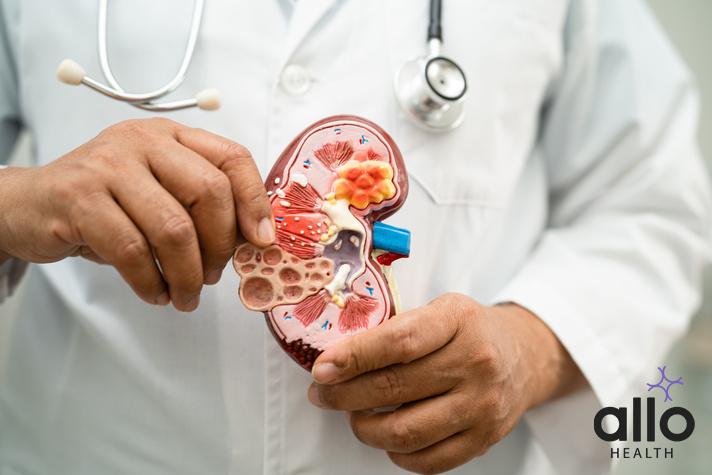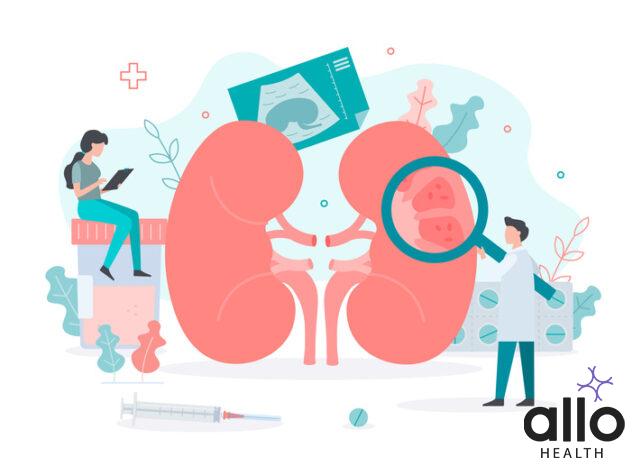Effects of Tadalafil On Kidney Function

Allo Health is dedicated to personalized well-being, offering support and trusted information tailored to individual health goals. The platform emphasizes human-generated content, led by a distinguished medical team of experts, including physicians and sexual health specialists. Their commitment to credibility involves rigorous fact-checking, authoritative research, and continuous updates to ensure accurate, up-to-date information. Allo Health's unique approach goes beyond conventional platforms, providing expert-led insights and a continuous commitment to excellence, with user feedback playing a crucial role in shaping the platform's authoritative voice.

Dr Sanina Mansoor holds MBBS degree from Yenepoya university,Mangalore.She has 8 years of experience working as a medical officer at various health centres and medical colleges.
Why This Was Upated?
Our experts continually monitor the health and wellness space, and we update our articles when new information became available.
Updated on 21 December, 2023
- Article was updated as part of our commitment to diversity, equity, and inclusion.

"The following blog article provides information about a drug or brand name drug and its potential effects or benefits. However, it is crucial to understand that this information is intended for general educational purposes only and should not be considered a substitute for professional medical consultation. It is highly recommended to consult with a qualified healthcare professional before making any decisions regarding medication, treatment, or healthcare management.
Book consultation
Individuals have unique medical conditions, and the information provided in this article may not be applicable to everyone. Only a qualified healthcare provider can evaluate your specific medical situation, taking into account your medical history, conducting appropriate tests, and providing personalized advice and recommendations. They are equipped to make informed decisions tailored to your individual needs.
It is crucial to emphasize that self-diagnosis, self-medication, or disregarding medical advice can have serious health consequences. This article may reference specific brand names or drugs for illustrative purposes. Mention of these names does not imply endorsement, recommendation, or guarantee of their efficacy or safety. The choice of medication should be based on discussions and individualized guidance from a healthcare professional who has a comprehensive understanding of your medical condition.
"Tadalafil is a widely prescribed medication primarily used for treating erectile dysfunction. It belongs to a class of drugs called phosphodiesterase type 5 inhibitors (PDE5 inhibitors), which work by relaxing the blood vessels in the body and increasing blood flow to the genital area. However, as with any medication, there are potential side effects and concerns to be aware of. In this article, we’ll take a closer look at the link between tadalafil and kidney function, and explore whether or not using tadalafil can have negative effects on kidney health.
Tadalafil Preview
Tadalafil is a medication that falls into the class of drugs known as phosphodiesterase type 5 (PDE5) inhibitors. It is primarily used to treat erectile dysfunction (ED), a condition where a man has difficulty achieving or maintaining an erection. Tadalafil is also prescribed for the treatment of benign prostatic hyperplasia (BPH) and pulmonary arterial hypertension.
Here is a detailed overview of tadalafil:
Mechanism of Action:
- Tadalafil works by inhibiting the enzyme phosphodiesterase type 5 (PDE5). This enzyme is responsible for breaking down cyclic guanosine monophosphate (cGMP), a chemical that helps to relax the smooth muscles in the penis and increase blood flow. By inhibiting PDE5, tadalafil helps to maintain higher levels of cGMP, promoting better blood flow to the penis and facilitating an erection.
Indications:
- Erectile Dysfunction (ED): Tadalafil is widely used to treat ED, helping men achieve and sustain an erection during sexual activity.
- Benign Prostatic Hyperplasia (BPH): In combination with other medications, tadalafil is used to treat the symptoms of BPH, such as difficulty urinating, urgency, and frequency.
- Pulmonary Arterial Hypertension: Tadalafil is also prescribed to treat high blood pressure in the lungs (pulmonary arterial hypertension).
Dosage and Administration:
- Tadalafil is available in various strengths, including 2.5 mg, 5 mg, 10 mg, and 20 mg tablets.
- The recommended starting dose for ED is usually 10 mg taken at least 30 minutes before sexual activity. The dose can be adjusted based on individual response.
- For daily use in the treatment of ED, a lower dose of 2.5 mg or 5 mg may be prescribed.
- The dose for BPH is typically 5 mg taken once a day.
- The dose for pulmonary arterial hypertension varies and is determined by a healthcare professional.
Duration of Action:
- Tadalafil has a longer duration of action compared to some other PDE5 inhibitors. It can remain effective for up to 36 hours, earning it the nickname “the weekend pill.”
Side Effects:
- Common side effects include headache, flushing, indigestion, back pain, and muscle aches.
- Serious side effects are rare but can include changes in vision, hearing loss, and priapism (a prolonged and painful erection). Seek medical attention if these occur.
Contraindications:
- Tadalafil is contraindicated in individuals taking nitrates, as the combination can lead to a dangerous drop in blood pressure.
- It is not recommended for those with severe liver or kidney impairment.
Interactions:
- Tadalafil can interact with certain medications, including alpha-blockers, antihypertensives, and other PDE5 inhibitors.
Precautions:
- Before taking tadalafil, it’s important to inform your healthcare provider about your medical history and any other medications you are taking.
- Avoid alcohol consumption in excess, as it may increase the risk of side effects.
It’s crucial to consult with a healthcare professional before starting any medication, including tadalafil, to ensure that it is safe and appropriate for individual health conditions and needs.

Tadalafil Side Effects
Tadalafil, like any medication, may cause side effects. It’s important to note that not everyone will experience these side effects, and in many cases, they are mild and temporary. Here is a detailed list of potential side effects associated with tadalafil:
Common Side Effects:
- Headache: This is one of the most common side effects and often occurs at the beginning of treatment. It is usually mild and may improve as your body adjusts to the medication.
- Facial Flushing: Tadalafil can cause blood vessels in the face to widen, leading to a flushed or warm sensation.
- Indigestion or Upset Stomach: Some people may experience gastrointestinal discomfort, including indigestion, stomachache, or nausea.
- Back Pain and Muscle Aches: These side effects are more common with higher doses. They are generally mild to moderate and may improve with time.
- Nasal Congestion: Tadalafil may cause a stuffy or runny nose in some individuals.
- Dizziness: A feeling of lightheadedness or dizziness may occur, especially when standing up from a sitting or lying position.
Less Common Side Effects:
- Vision Changes: Some people may experience changes in vision, such as a bluish tint or difficulty distinguishing between blue and green colors. These effects are rare but require immediate medical attention.
- Hearing Loss or Ringing in the Ears: While rare, sudden hearing loss or ringing in the ears (tinnitus) has been reported in some individuals using PDE5 inhibitors, including tadalafil.
- Priapism: This is a rare but serious side effect involving a prolonged and painful erection. If this occurs, seek immediate medical attention, as untreated priapism can lead to permanent damage to the penis.
Serious Side Effects (Rare):
- Allergic Reactions: Some people may experience allergic reactions, including skin rash, itching, or swelling of the face, lips, or tongue. Seek medical attention if you suspect an allergic reaction.
- Heart-related Concerns: In rare cases, tadalafil can cause heart-related side effects, such as chest pain or a sudden decrease or loss of vision.
- Hypotension (Low Blood Pressure): Tadalafil can lower blood pressure, particularly when taken with other medications that also lower blood pressure. This can lead to dizziness or fainting.
It’s important to consult with a healthcare professional if you experience any side effects while taking tadalafil. Additionally, individuals with certain pre-existing conditions, such as cardiovascular concerns or liver/kidney concerns, should exercise caution and inform their healthcare provider before starting tadalafil.
This list is not exhaustive, and individual responses to medications can vary. Always follow the prescribed dosage and instructions provided by your healthcare provider. If you have concerns about potential side effects or interactions, discuss them with your doctor.
Tadalafil Effects on Kidney Function
Tadalafil, a phosphodiesterase type 5 (PDE5) inhibitor, is primarily metabolized by the liver and excreted through feces. While the primary focus of tadalafil is not on the kidneys, it’s essential to consider its effects on kidney function, especially in individuals with pre-existing renal conditions. Here’s a detailed overview:
- Metabolism and Excretion:
- Tadalafil is predominantly metabolized in the liver by the enzyme CYP3A4. The major circulating metabolite is formed through a process of oxidative metabolism.
- The elimination half-life of tadalafil is relatively long, around 17.5 hours. However, the drug is primarily excreted in the feces (approximately 61%) rather than the urine (approximately 36%).
- Use in Patients with Renal Impairment:
- Tadalafil is generally considered safe for use in individuals with mild to moderate renal impairment (i.e., creatinine clearance 30–80 mL/min). However, caution is advised, and dosage adjustments may be necessary.
- Severe Renal Impairment and End-Stage Renal Disease (ESRD):
- Limited information is available regarding the use of tadalafil in patients with severe renal impairment or end-stage renal disease (ESRD).
- The use of tadalafil is not recommended in patients with severe renal impairment (creatinine clearance less than 30 mL/min) or ESRD.
- Monitoring and Adjustments:
- For patients with mild to moderate renal impairment, no dose adjustments are usually required.
- In individuals with severe renal impairment or ESRD, the use of tadalafil should be approached with caution, and a thorough assessment of the potential risks and benefits should be conducted.
- Drug Interactions:
- Tadalafil is metabolized by the cytochrome P450 3A4 enzyme. Drugs that inhibit or induce this enzyme may affect the metabolism and clearance of tadalafil.
- Certain medications used for kidney function or co-administered with medications that affect kidney function may potentially interact with tadalafil. It’s essential to inform healthcare providers of all medications being taken.
- Fluid Balance and Blood Pressure:
- Tadalafil can cause a decrease in blood pressure, and individuals with renal impairment may be more susceptible to this effect.
- Adequate hydration and monitoring of blood pressure are important considerations, especially in individuals with compromised renal function.
- Individual Variability:
- Individual responses to medications can vary, and factors such as age, overall health, and concomitant medications play a role in how the body processes tadalafil.

Patients with kidney impairment should always consult with their healthcare provider before using tadalafil. The dosage and suitability of the medication will be determined based on individual health status and renal function. If there are concerns or changes in kidney function during tadalafil treatment, it’s crucial to communicate these with a healthcare professional for appropriate management.
Frequently Asked Questions
- Can tadalafil affеct kidnеy function?
Yеs, tadalafil is primarily mеtabolizеd in thе livеr, and its еlimination involvеs еxcrеtion through thе fеcеs rathеr than thе kidnеys. It is gеnеrally considеrеd safе for individuals with mild to modеratе rеnal impairmеnt. Howеvеr, caution is advisеd in sеvеrе rеnal impairmеnt or еnd-stagе rеnal disеasе (ESRD), whеrе its usе may not bе rеcommеndеd. - Should individuals with kidnеy issuеs bе cautious whеn using tadalafil?
Yеs, individuals with kidnеy issuеs should еxеrcisе caution whеn using tadalafil. Whilе it is gеnеrally safе for thosе with mild to modеratе rеnal impairmеnt, thosе with sеvеrе impairmеnt or ESRD should consult thеir hеalthcarе providеr bеforе using tadalafil, as dosagе adjustmеnts may bе nеcеssary. - How doеs tadalafil impact blood prеssurе in individuals with kidnеy problеms?
Tadalafil can causе a dеcrеasе in blood prеssurе, and individuals with compromisеd kidnеy function may bе morе suscеptiblе to this еffеct. Adеquatе hydration and monitoring of blood prеssurе arе important considеrations whеn using tadalafil in individuals with kidnеy impairmеnt. - Arе thеrе spеcific considеrations for tadalafil usе in patiеnts with sеvеrе kidnеy impairmеnt?
Yеs, for patiеnts with sеvеrе rеnal impairmеnt (crеatininе clеarancе lеss than 30 mL/min) or ESRD, thе usе of tadalafil is gеnеrally not rеcommеndеd. A carеful assеssmеnt of potеntial risks and bеnеfits, along with altеrnativе trеatmеnt options, should bе discussеd with a hеalthcarе providеr. - Can mеdications affеcting kidnеy function intеract with tadalafil?
Yеs, mеdications that impact kidnеy function or arе co-administеrеd with drugs affеcting kidnеy function may intеract with tadalafil. It is crucial to inform hеalthcarе providеrs about all mеdications bеing takеn to avoid potеntial intеractions and еnsurе safе usе of tadalafil in individuals with kidnеy concеrns.






































